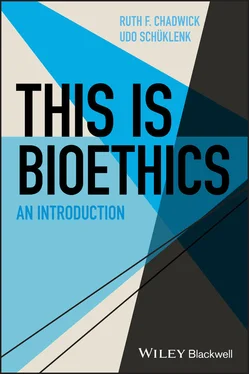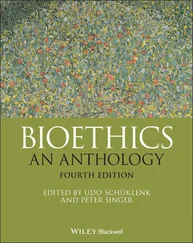3.7 Bioethics as we know it today is in many ways a creation of the 1970s. Robert Baker writes that the political and cultural changes sweeping through the United States from the mid 1960s created the ideological ground for the birth of bioethics (Baker 2013: 275). Well, what exactly happened during those years? A number of things occurred nearly concurrently. Scandals in scientific research rocked the country. Henry K. Beecher 13 , a Harvard based medical doctor, published in 1966 an article in a top‐flight medical journal, the New England Journal of Medicine 14 , flagging fairly outrageous unethical research practices in some 22 or so medical studies, many of which were funded by United States’ government agencies (Beecher 1966). Beecher’s article led subsequently to a US government investigation and a whole slew of policies and regulations addressing ethical standards in biomedical research were introduced and eventually implemented. This wasn’t a uniquely United States’ problem. Two years earlier Maurice H. Pappworth 15 , an English physician, blew the whistle 16 on scandalous research ethics failings in the United Kingdom (Harkness 2001, 366). You will hear more about these episodes in the history of bioethics in Chapter 7.
3.8 Both medical professionals as well as patients saw also the advent of revolutionary medical technologies, such as dialysis machines, ventilators and in‐vitro fertilization (IVF). IVF in particular gave rise to a whole host of controversial normative questions about ‘new ways of making babies’. Traditionally understood medical ethics was simply ill‐equipped to deal with these issues. Meanwhile various groups demanded specific liberties from oppressive medical practices for themselves. The psychiatrist Thomas Szasz 17 fought from the 1960s to liberate people from what he considered to be an oppressive psychiatry (Schaler 2004). Gay activists demanded from the American Psychiatric Association that it remove homosexuality from its list of mental illnesses 18 . They denied that there ever was a scientific basis for the profession’s mental illness designation verdict of homosexuality (Bayer 1981). These activists succeeded in 1973. Equally, women also fought to gain control over their bodies from the medical profession and the law, campaigning to have abortion decriminalized. In 1973 in Roe v Wade the United States Supreme Court decriminalized abortion 19 . In 1988 the Supreme Court in neighboring Canada, in effect, declared laws limiting access to abortion unconstitutional ( R v. Morgentaler, [1988] 1 S.C.R. 30 20 ).
3.9 In a very general sense, trust that the doctor or medical researcher knows best, as it were, was replaced with the idea that competent patients are entitled to make their own self‐regarding choices and to see those choices respected by health care professionals and clinical researchers. Today, in many jurisdictions, patients are legally entitled to decline even life‐preserving medical care, provided they are competent at the time of their decision‐making. Patients became more powerful, medical researchers and doctors’ generally saw their powers cut.
3.10 Since those relatively early days, bioethics has seen a whole range of specializations. Researchers in public health ethics 21 address questions to do with moral issues arising in the context of health care delivery on population levels. They are concerned about problems as varied as the ethical treatment of multiple‐drug resistant tuberculosis patients 22 , or the ethical challenges posed by the large number of young people with minor traumatic brain injuries 23 caused by popular sporting activities. We will be taking a closer look at public health ethics in Chapter 13. At the other extreme is arguably the equally young field of neuroethics 24 . It is concerned with the ethical implications of recent advances in neuroscientific research. Should we provide medication to patients with post‐traumatic stress disorder that would make them forget permanently 25 whatever traumatic events they experienced? Is it ethically acceptable for students to take memory or attention enhancing drugs 26 ? Neuroethics research overlaps to some extent with concerns driving transhumanists 27 . They are hoping that eventually we would be able to ‘upgrade’ our flawed bodies by technological means, permitting us to be more intelligent, more moral, live much longer, love better, and generally transcend what biological evolution has so far permitted us to be. You will come across these sorts of questions in Chapter 8.
3.2 Who Can Claim to be a Bioethicist?
3.11 This is a trickier question than you might think. Unlike medicine or nursing, bioethics is not a profession 28 . We agree with Bullock and Trombley that ‘a profession arises when any trade or occupation transforms itself through the development of formal qualifications based upon education, apprenticeship, and examinations, the emergence of regulatory bodies with powers to admit and discipline members, and some degree of monopoly rights ’ (1999, 689). There are no statutory boards regulating the affairs of bioethicists. Bioethicists certainly have no monopoly powers like doctors, for instance, when it comes to the right to prescribe medication. When you consider the earlier mentioned events that gave rise to bioethics in the United States, you likely won’t be surprised to learn that academics from a number of disciplines were involved in thinking about some of these normative challenges. Among the founders of bioethics were, of course, philosophical ethicists, but there were also, and quite prominently so, Christian ethicists, legal professionals, health care professionals, sociologists, political scientists, even historians. Christian bioethicists obviously have different conceptual modi operandi than secular bioethicists or bioethicists coming from a legal background. It is worth keeping in mind that no single academic discipline ‘owns’ bioethics. Empirical sociologists have become increasingly active in the field, engaging in both qualitative and quantitative work on bioethical issues, ranging from the rights and wrongs of abortion, reproductive cloning and euthanasia to any number of other issues. When queried they may or may not wish to identify with the label ‘bioethicist’, but there are ongoing and important debates about the role of empirical evidence in ethical decision‐making and about how the disciplines of Sociology and Philosophy can and should work together. Clearly empirical facts about perceptions or attitudes do not determine what is right. Nevertheless, data about what is regarded as acceptable can and do influence what is politically feasible, challenge the universal applicability of certain policies in the light of cultural differences, and for some, challenge the very possibility of universal ethical principles in ethics.
3.12 A lively debate continues among people working in the field about the question of ‘who is a bioethicist’. Today specialized programs exist in universities that award doctoral degrees in bioethics. For the purpose of this volume we are looking specifically at how philosophical ethics bears on bioethical questions.
3.13 However, it is worth noting that, as in any evolving field, bioethicists have expanded the scope of their activities. The field continues to grow in leaps and bounds, both with regard to academic subject matters as well as with regard to efforts to professionally accredit the activities of subsets of bioethicists. Extensive efforts are underway to provide accreditations to clinical ethicists, that is ethicists substantially involved in ethics consultations at the (hospital) bedside. The American Association for Bioethics and Humanities 29 (ASBH) has taken the lead on this subject matter and produced handbooks on core clinical ethics competencies and related matters.
Читать дальше












